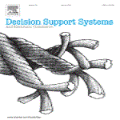Experimental design in field robotics is an adaptive human-in-the-loop decision-making process in which an experimenter learns about system performance and limitations through interactions with a robot in the form of constructed experiments. This can be challenging because of system complexity, the need to operate in unstructured environments, and the competing objectives of maximizing information gain while simultaneously minimizing experimental costs. Based on the successes in other domains, we propose the use of a Decision Support System (DSS) to amplify the human's decision-making abilities, overcome their inherent shortcomings, and enable principled decision-making in field experiments. In this work, we propose common terminology and a six-stage taxonomy of DSSs specifically for adaptive experimental design of more informative tests and reduced experimental costs. We construct and present our taxonomy using examples and trends from DSS literature, including works involving artificial intelligence and Intelligent DSSs. Finally, we identify critical technical gaps and opportunities for future research to direct the scientific community in the pursuit of next-generation DSSs for experimental design.
翻译:实地机器人的实验设计是一个适应性强的 " 人到行 " 决策过程,实验者通过与机器人的互动,以已建实验的形式了解系统性能和局限性,这具有挑战性,因为系统复杂,需要在非结构化环境中运作,同时尽量减少实验成本,实现信息收益最大化的相互竞争的目标。根据其他领域的成功经验,我们提议使用决策支持系统(DSS)来增强人类的决策能力,克服其固有缺陷,并促成实地实验中的原则决策。在这项工作中,我们提出了DSS的通用术语和六阶段分类,专门用于更丰富的信息测试的适应性实验设计以及降低实验成本。我们利用DSS文献的范例和趋势,包括涉及人工智能和智能DSS的作品,来构建和介绍我们的分类学。最后,我们确定了未来研究的关键技术差距和机会,以指导科学界在下一代DSS进行实验设计时,引导科学界。





